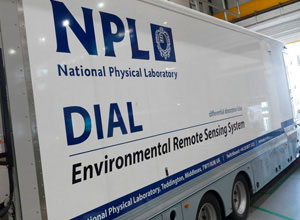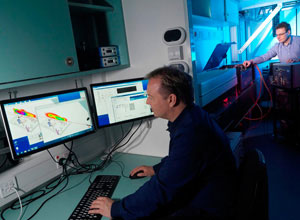| May 30, 2014 |
New laser lab on wheels to reduce emissions
|
|
(Nanowerk News) The Environmental Measurements Group and the Centre for Carbon Measurement at the National Physical Laboratory (NPL) have launched a new mobile laboratory to detect and measure emissions that are harmful to the environment.
|
|
The DIAL (Differential Absorption Lidar) facility is a sophisticated laser-based system that provides rapid, accurate measurements of airborne emissions. It is a completely self-contained mobile laboratory that can shipped, or driven, to where it is needed.
|
 |
| The new DIAL facility at NPL.
|
|
NPL’s current DIAL system has been used successfully by both regulators and companies to measure leaks from industrial sites, for example monitoring oil and gas emissions in Norway, benzene emissions in the Port of Rotterdam and methane leaks from landfill sites for Defra in the UK.
|
|
The new, next-generation facility has been built thanks to over £1 million investment by NPL and support for the underpinning science from the National Measurement Office, an executive agency of the Department for Business, Innovation and Skills. It will be used around the world to quantify and visualise emissions from industrial sites, informing operational efficiency improvements, reducing losses and supporting research and policy developments. Innovations include greater detection sensitivities that offer more accurate results, and a flexible system that enables operators to switch between the types of pollutants being measured.
|
 |
| A new software system will help deliver quicker results for customers.
|
|
This unique service that NPL offers globally creates 3D emission maps of various pollutants like airborne hydrocarbons. With faster deployment as well as more efficient data manipulation and usage through an improved software system, it delivers quicker results for customers.
|
|
Identifying emissions leaks and doing something to prevent them will reduce the environmental impact of the companies that use it, but also deliver clear commercial benefits. For example, methane has an economic value and preventing methane leaks means there is more gas to sell.
|
|
Jane Burston, Head of the NPL Centre for Carbon Measurement, said: “Detecting and quantifying leaks from industrial sites such as refineries, gas terminals and landfills is increasingly important if we are to meet corporate, national and international emissions targets and reduce the environmental impact of industry. Responsible businesses are keen to detect greenhouse gas leaks to reduce their impact on global warming, comply with regulation, support company environmental reporting and, in some cases, make sure they’re not losing a valuable gas. Having this rapid mobile system will help fulfil a high and growing demand for identifying and tackling emissions.”
|
|
David Mackay, Chief Scientific Advisor at Department for Energy and Climate Change (DECC), said: “The UK plays a leading role in emissions monitoring, as can be seen by the demand for NPL’s DIAL facility around the world. We still have a way to go to significantly cut emissions, but having a state-of-the-art facility that can provide precise data quickly, is a very helpful step towards this goal.”
|


